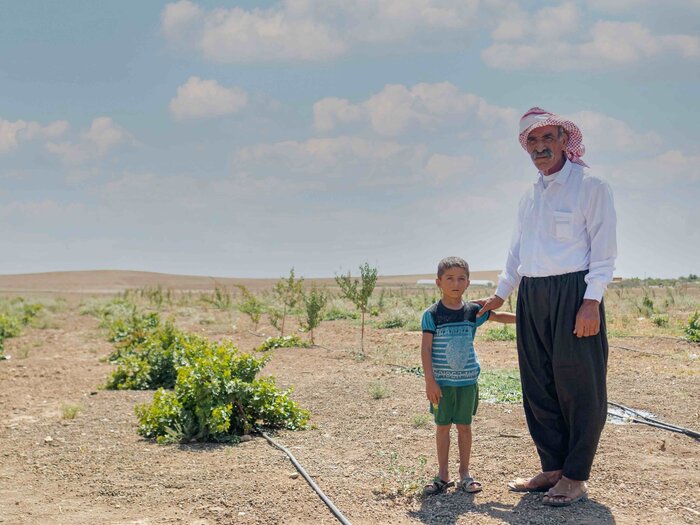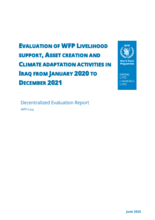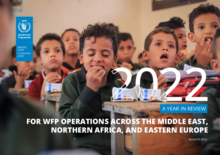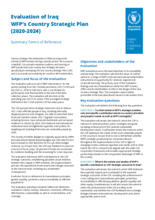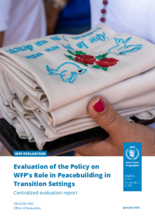Iraq
- 1.2 million
- Iraqis internally displaced by conflict
- 2.5 million
- people in acute need of food and livelihood assistance
- 44 million
- population
Iraq is an upper-middle-income country, ranking 121 out of 191 countries in the Human Development Index 2021-22. Sixty percent of its 44 million population is aged under 30. Unemployment stands at 15.5 percent and the youth rate is 36 percent. Opportunities are lacking for young people, who are key to unlocking the country’s potential growth. The national poverty rate has reached 31.7 percent, and in some governorates it is over 50 percent.
While the number of Iraqis requiring humanitarian assistance has decreased, 1.2 million internally displaced people (IDPs) and 247,000 Syrian refugees remain. Secondary displacement is not uncommon due to security and livelihood issues. The Government is pursuing reforms amid improved security and political stability – a difficult task as decades of sanctions, conflict, political instability and social unrest have eroded governance structures and diminished the institutional capacities of various ministries. Other factors such as rapid population growth, climate change, declining agricultural production, reduction of water flow in rivers and reservoirs, and inefficient food systems threaten Iraq’s food security and the achievement of zero hunger goals.
The World Food Programme (WFP) enhances social protection, skill development and livelihood projects for vulnerable communities, as well as providing smaller-scale emergency assistance for IDPs and refugees. WFP is further helping the Government to build people's self-reliance and food security, promoting longer-term social cohesion, peace and development. We work with partners to tackle the impact of climate change while building the capacity of the Government to respond to shocks and create sustainable livelihoods.
What the World Food Programme is doing in Iraq
-
Crisis response
-
WFP provides food assistance to Syrian refugees and recent returnees from displacement, through cash-based transfers, in-kind assistance or e-vouchers, depending on people’s needs. WFP supports 38,000 Syrian refugees and over 2,200 returnees with food assistance. We also support pregnant and breastfeeding women, and their infants, in the south of the country. WFP works with other agencies to support the Ministry of Labour and Social Affairs in integrating IDPs into the national social safety net, while also partnering with the Government’s Public Distribution System, so IDPs receive their rations closer to where they are based.
-
Skills training
-
WFP helps enhance the food security of vulnerable people by promoting digital skills through the national Jousour Programme, which was successfully adopted by the Government of Iraq's Ministry of Higher Education & Scientific Research to help young people in Iraq build their livelihoods. WFP's training equips Syrian refugees and vulnerable Iraqi youth with digital and English language skills to help them secure decent work. The programme has over 9,000 alumni in Iraq. In 2022, more than 750 beneficiaries were trained in the Kurdistan region and the governorate of Anbar. In collaboration with the Government, it is planned to train 1,950 participants across 6 universities on digital skills. Furthermore, WFP-supported Vocational Training Centers across Iraq provide on-demand training to unemployed youth, IDPs, and vulnerable youth with skills such as training in photography, baking, knitting, or carpentry in Iraq.
-
Social protection
-
WFP and the Ministry of Trade are digitalizing the Public Distribution System for food rations, Iraq’s biggest social protection programme. Smartphone applications will allow people to easily and safely update their family information and contact staff while remaining at home. By providing effective entrepreneurship services, start-up support in the form of cash or in-kind, mentorships, and employment opportunities to the most vulnerable communities in Iraq, WFP helps facilitate the transition from social assistance to self-reliance.
-
School feeding
-
WFP and the Ministry of Education run the National School Feeding Programme, which expanded coverage to 13 governorates during the 2022-2023 academic year, reaching over 450,000 students in over 1,400 schools. WFP has been supporting the Ministry through training and capacity-building initiatives, so it can implement the programme. WFP will continue to support the Government in developing a national school feeding policy and a capacity strengthening plan.
-
Climate action
-
WFP’s work includes afforestation and agricultural conservation to combat desertification, as well as the promotion of modern irrigation methods to increase crop yields and optimize water use. WFP supports the improvement of climate-information services through the rehabilitation of modern automatic weather stations and training of Agro-Met staff in the Iraqi Ministry of Agriculture, WFP is working with Mosul University and Governorates of Ninewa and Anbar on piloting projects for combating desertification, which is a major issue in Iraq. In Kurdistan region, we are supporting efforts of the Ministry of Agriculture and Water Resources to prevent deforestation and develop an ambitious afforestation plan, using funding from voluntary carbon markets.
Iraq news releases
Go to pageFind out more about the state of food security in Iraq
Visit the food security analysis pageOperations in Iraq
Contacts
Office
UN Compound, International Zone
Iraq

